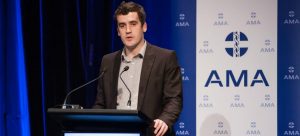We recently spoke with James Lawler, medical student writer, about starting a writing career as a health professional.
As the next generation of doctors enters the field in our social media era, one could argue that there’s never been a more challenging and exciting time to be a health professional.
The internet gives doctors tools and techniques to connect with both colleagues and the general public; the flip side being, of course, that they must constantly contend with Dr Google and all the questionable health blogs and advice that can be found online.
While the internet provides opportunities for doctors to become involved in these debates, joining in isn’t for everyone. In fact, in some countries, regulations and codes prevent health professionals and medical students from fully engaging in writing blogging and social media. Others may not want to have a social media presence for privacy reasons.
Still, knowing how to best communicate with patients and peers in the face of these issues is an important consideration for the world’s future doctors.
Health advice isn’t the only option for medical students and doctors with an interest in writing, though. The journey to becoming a practicing doctor is varied, and many medical student writers are interested in writing to help support their colleagues, supplement their medical career with an alternate income stream, join the esteemed list of medically-trained authors, pursue a desire to become a doctor-journalist or fuel a personal passion for the written word.
So just how does a medical student with an interest in writing get started?
I recently spoke about these issues with James Lawler, a final year medical student from the University of Newcastle in New South Wales, Australia.
James was the President of the Australian Medical Students’ Association in 2015 and is a keen writer and communicator. He’s also a regular contributor to 14 Gauge, a creative new platform for medical students (more on that later).
James is one of an emerging breed of medical student writers who are exploring new avenues for combining their traditional medical training and qualifications with a love of writing and communication in the digital era.
“I spent 2015 as the President of the Australian Medical Students’ Association, and during that time I enjoyed the opportunity to write often,” James recalls.
“My experience has told me that whilst doctors are most often drawn to write research papers, how our research and knowledge is communicated within the medical profession and the public, as well as how it is implemented in our practice and in broader policies is often lacking.”
James believes good communication skills are key to closing this gap – and it was this belief that lured him to the practice of writing, in a way.
“I was drawn to medical writing because the way in which medical students respond to writing is interesting and varied. I’m constantly told that my generation has a shorter attention span than the previous, and I think that holds true – it means that writing needs to be concise and to the point to hold the attention of the reader in the social media age. But my peers are also well-educated, and many are quite interested in reading lengthy well-structured, researched articles as well,” he says.
A voice for the next generation
James is currently a regular contributor for 14 Gauge, a new niche website that publishes articles for medical students and young doctors. He’s written about a diverse range of important topics, including bullying in medicine and issues surrounding internships for future doctors.
“Whilst there are a number of existing platforms aimed at doctors which have been around pre-internet, there isn’t a space in Australia for the next generation – hopefully we can fill this gap with something interesting!”
Having spent the past couple of years focusing on developing his medical writing skills, James’ top advice for new doctors and students who are interested in writing is simple: read and write.
“Reading others’ writing and practicing your own writing are the most important ways to hone your skills,” he advises.
“I think nothing helps more than getting experience by practicing. I wrote a number of editorials last year for a range of mainstream and medical media platforms, and as my confidence grew my writing improved. But the biggest improvement which has come with practice has been the speed at which I can write. Learning how to be ‘in the zone’ when I sit down to write and how to proof-read and reference my work efficiently were difficult at first I’ve improved this over time.”
James is also an avid reader and believes that reading has been instrumental in improving his writing. “I like reading and try to make sure I’m always reading things from outside the medical profession too. I’ve usually got several books half-read – at the moment I’m partway through Poor Economics, Man’s Search for Meaning, and The Fictional Woman.”
Read more of James’ writing at 14Gauge and follow him on Twitter (@jmslwlr)
